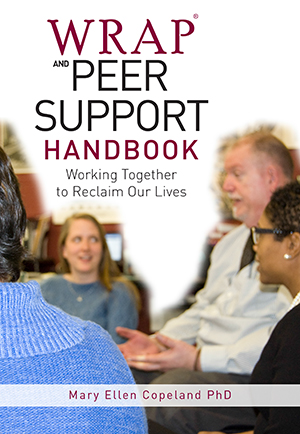Peer support in mental health has recently gained significant attention. We see terms like “peer support”, “peer specialists” and “lived experience”, but what do they actually mean? Very simply, a peer is a person who can offer support by virtue of the fact that he or she has “been there, done that”, and can relate to others who are now in a similar situation. That is also referred to as “lived experience”. People who have similar experiences [for example: substance abuse problems, the loss of a child, combat veterans and so on], can better relate and can offer more authentic empathy and validation than those without the shared experience and are often able to offer each other practical advice and suggestions for change that “trained ” professionals may not know or even have thought about.
The combination of WRAP and Peer Support is very powerful in helping peers grow, learn from each other and challenge each other beyond what was thought possible. Peer Support is a way of managing relationships, and WRAP is a way of managing life. Using Wrap and Peer Support together can help build the strong relationships and community that can be the first steps in the recovery process.
Although there is no universal definition of the term “peer support”, Shery Mead, founder of International Peer Support, offers the following:”Peer support is a system of giving and receiving help founded on key principles of respect, shared responsibility, and mutual agreement of what is helpful. Peer support is not based on psychiatric models and diagnostic criteria. It is about understanding another’s situation empathically through the shared experience of emotional and psychological pain. When people find affiliation with others they feel are ‘like’ them, they feel a connection. This connection, or affiliation, is a deep, holistic understanding based on mutual experience where people are able to ‘be’ with each other without the constraints of traditional (expert/patient) relationships.” (Mead, 2001)
According to the International Association of Peer Supporters [INAPS], “a peer supporter is an individual who has made a personal commitment to his or her own recovery, has maintained that recovery over a period of time, has taken special training to work with others, and is willing to share what he or she has learned about recovery in an inspirational way.”
Peer Specialists are those who are not only committed to their own recovery, but have completed training and testing that is specific to the type of peer support they will be providing. Many states already have in place a certification process to become a Certified Peer Specialist [CPS]. WRAP Facilitators are peers with lived experience and come to the table as equals to those seeking support.
The combination of WRAP and Peer Support is a win-win situation. The person receiving the peer support benefits from the shared experience and training of the peer supporter, and the peer supporter retains an incentive to stay well because they have become a role model to others. WRAP has been and continues to be a major component of this recovery oriented approach.
Read the WRAP and Peer Support Handbook for an in depth look into how these recovery models work together.

Mary Ellen Copeland, PhD, developed Wellness Recovery Action Plan (WRAP) with a group of people with lived experience who were attending a mental health recovery workshop in 1997. She is the original author of the WRAP Red Book, as well as dozens of other WRAP books and materials. She has dedicated the last 30 years of her life to learning from people who have mental health issues; discovering the simple, safe, non-invasive ways they get well, stay well, and move forward in their lives; and then sharing what she has learned with others through keynote addresses, trainings, and the development of books, curriculums, and other resources. Now that she is retired, and that, as she intended, others are continuing to share what she has learned, she continues to learn from those who have mental health issues and those who support them. She is a frequent contributor to this site.






